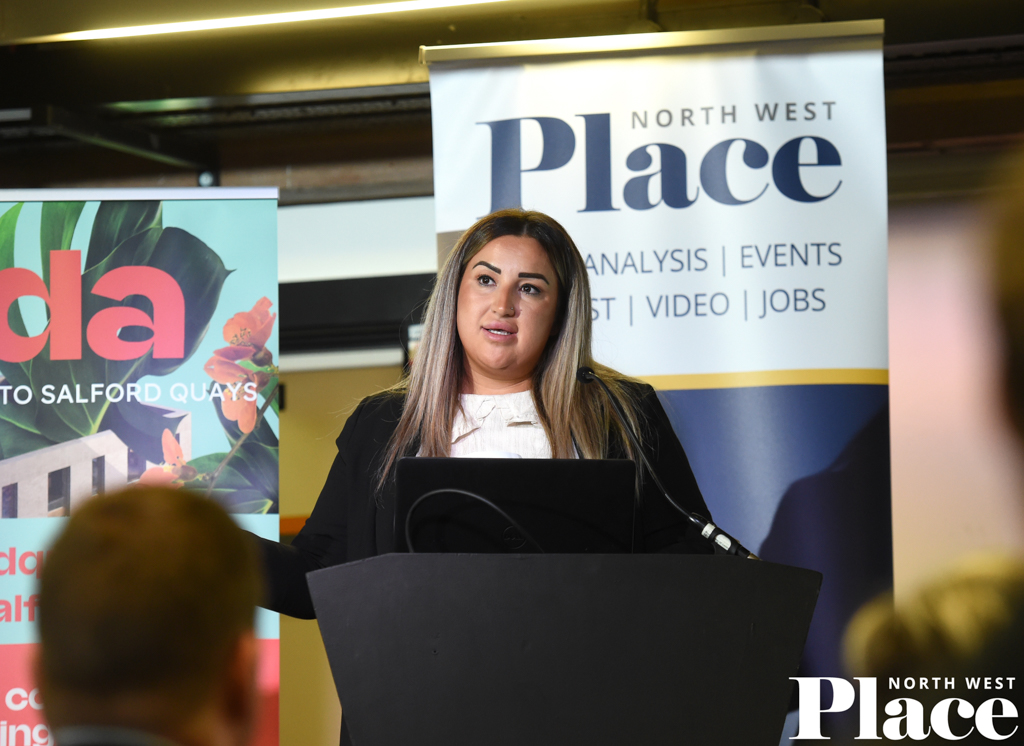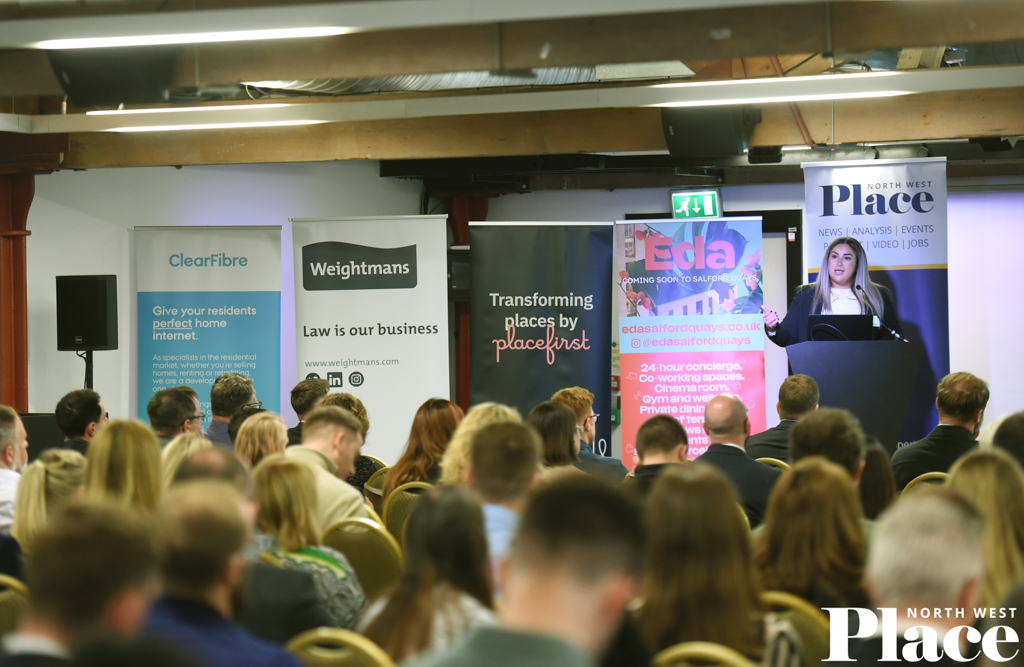At this year’s Place North West BTR Conference in Manchester, Yardi’s Solutions Consultant, Megi Cara, held a presentation around the importance of scale in the Build to Rent (BTR) sector, exploring the advantages, how technology can facilitate scale and the challenges property developers, operators and investors may face.
The Housing Shortage and the Need for Scale

Starting the presentation Cara delves into the pressing matter of the housing shortage within the UK. She highlights that “to comprehend the importance of scale, it is crucial to examine the current market landscape,” and further states that “the housing shortage in the UK demands immediate attention.”
Recent statistics pulled from a report conducted by Savills reveal that over “£4 billion was invested in the BTR sector last year, with £1 billion invested in the last quarter alone.” These figures underscore the significant appetite among investors for scaling up. However, despite the high investments, “there is still a shortage of approximately 4.3 million homes in the country, a situation that extends beyond the Northwest region.”
Factors contributing to this shortage include “landlords’ withdrawal from the rental sector – causing over 330,000 buy to let redemption of mortgages since 2016.” Private property owners who are coming to the end of their fixed-rate mortgages are now having to refinance at an increased rate. This results in the second contributing factor towards the housing shortage, which is “higher rental costs for the tenants.” Lastly, new regulatory changes within EPC requirements as well as Capital Gains Tax allowance in the Autumn Statement, means we are likely to see greater urgency to sell – further widening the gap in the housing shortage.
But, with net migration figures on the rise, “partly due to the results of the worldwide conflicts and also accelerated by student migration,” the demand for housing is further amplified. Therefore, addressing this shortage requires a keen focus on scale.
Advantages of Scaling in BTR
The advantages of scaling in the BTR sector are multifaceted. Economies of scale, for instance, allow BTR operators to leverage the benefits of bulk purchasing, resulting in lower costs for renters. Cara states that by negotiating national contracts for services and products such as maintenance, operation and heating supplies, “Operators can offer more affordable rental rates to tenants.” She emphasises “BTR is at an above average price point,” so without this affordability factor which scale provides, BTR would not be able to expand and ensure that renting remains an accessible, viable option for individuals.
From an investor’s perspective, scale offers attractive opportunities. “Not only are they the enablers of scale, but investors seek to deploy significant capital” and reap substantial returns on their investments. Scaling up BTR portfolios enables investors to achieve these objectives while also contributing to addressing the housing shortage within the UK.
In addition to economic advantages, scale brings both environmental and social benefits. Reflecting on an event attended in the past, Cara shares with the audience a statement made by Anne Kavanagh, CEO of Telford Homes, who stressed, “As we scale, we must not only be responsible actors and serious about sustainability, but we also need to start considering the social and governance in ESG.”

This statement goes on to further emphasise the notion that scale not only addresses affordability but also improves the well-being of communities. Scale can help benefit tenants, as it allows institutional investors to provide security of tenures and address the cost of living within larger developments. But by scaling up, BTR providers can also offer and “implement shared cost schemes, which consequently help to reduce cost, improve living standards and tackles the housing shortage.”
The Role of Technology in Scale
Technology plays a pivotal role in facilitating the scalability of BTR developments “by helping to reduce friction in operational processes and improving the renter experience.” Cara highlights that the rental market is a transactional business, “It’s more than about the design and the amenities. It’s about the touch points that help convert that prospect into a tenant.” Therefore, by leveraging technology, “BTR operators can streamline tasks and reduce pain points,” as well as “enhance their efficiency and effectiveness of large-scale operations.”
This includes providing a seamless renter journey, from decision-making to ongoing engagement and retention. However, Cara notes that it is essential to balance technology and the human touch. While technology can enhance operations, it should not overshadow the importance of personalised interactions with renters, which can further ensure the brand’s character and community engagement remain consistent.
Challenges of Scale
Cara wraps up the presentation by highlighting the challenges that BTR operators will face with scaling. One such challenge is maintaining brand consistency. As BTR operators expand their operations geographically, it becomes essential to preserve the unique character and community feel of each development. Balancing the need for consistency with the desire to adapt to local contexts requires careful consideration and strategic decision-making. As “developers become more process-driven the challenge for them will be to maintain that soft touch that makes BTR special.”
Another challenge lies in sustaining a value-driven operation. When scaling, developers “must have a scale mindset during the early stages” and throughout the development process. This ensures that decisions align with the long-term goals, and better strategic choices are made regarding “employee recruitment and the sustainability of building projects.” Adopting a scale mindset not only plans for growth and helps to avoid difficulties when expanding operations in the future, but it also helps providers meet their renters’ demands and values – which if lacking can lead to tenants leaving. Thus, “It’s not just about the building, BTR providers need to demonstrate the right values, the right culture, if they wish to maintain their residences.”
Finally, system architecture should be a key consideration. “Scalability should extend beyond technology,” it shouldn’t only deliver enhanced business decisions but also provide consistent customer experiences, across all developments. It is therefore essential to establish a robust and scalable system architecture, which is supported by advanced technologies but also allows operators to deliver.
What Is Next for The Rental Market?
Following her presentation, Cara joined a panel comprising of industry experts – Shannon Conway, residential director of Glenbrook, Quentin Keohane, director of Falconer Chester Hall, David Mawson, chief executive of Placefirst and Dr Penny Clark, director of Conscious Coliving. Together, they delved into the future prospects and developments within the rental market.

Spotlight takeaways included:
“There’s still not a great understanding in the rental market that for certain people, they might value other things such as social connections and integrated neighbourhoods.”
“People are wanting to live in high-quality homes, which are energy efficient and which create communities.”
“We need to start planning around tenants’ lifestyle as opposed to just where they live.”
“You’ve got to listen to the residents and get their feedback to understand what was good, what can be improved and what is going to be used and taken into account for the future.”
“Providers need to make sure that the products they deliver meet the needs of residents and communities but are also flexible enough to be reused and changed as we go forward.”
“Developers need to make sure that what they are working on now is going to be applicable for five to 10 years and is going to look as good as it did on day one.”
“Future properties need to meet demand and must stay desirable. That’s the key thing wanted by the resident.”
“Whether you’re developing apartments or houses, as long as you get the product right, there will certainly be demand.”
See what events we’ll be attending in 2023 and meet with Team Yardi or get in touch to see how our end-to-end property management technology for BTR can help with scalability.